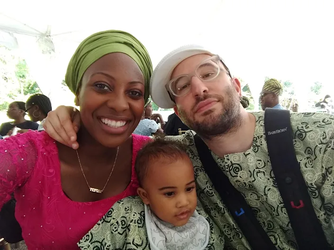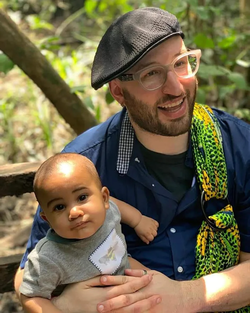
After turning 2 years old, my son, Avishai, started demanding that he only wear tractor shirts, and my mind spiraled into darkness. I catastrophized worst-case scenarios, imagining a world where he fell for everything stereotypically manly. I envisioned him on a football field, barreling through mega-muscled opponents. Imagined him waxing a sports car on a warm summer day. I have always judged other guys who seemed boxed in by masculinity, but 3 ½ years ago, when I became a stay-at-home dad, my bias skyrocketed.
My son was born in Albany, New York, on the bedroom floor of the apartment I shared with my wife. Minutes after his arrival, we took turns cuddling him against our bare chests. While the midwife and her assistant cleaned up, my wife, always one to joke, even soon after giving birth, bragged that she had a connection to our new baby that I could never attain because men couldn’t bond with babies like women could.
Her comment stabbed into me, but I feared she was right. To me, femininity was connected to empathy and kindness while masculinity equated to being frigid. Men didn’t hug. Men didn’t say I love you. Men were angry. Aggressive. Inept as parents. I became determined. I was going to create a bond stronger than any parent had ever achieved, but I told myself that to do so I needed to distance myself from anything deemed masculine.
I immediately cut my hours at my social work gig, taking on the role of caregiving full time. It made sense because my wife made more money and I was accustomed to being around kids; it was what I did for a living. Every day I fed Avishai and cuddled him and soothed him. We co-slept, and he snoozed with his head resting on my chest, listening to the rhythm of my heartbeat. I began attending mommy-and-me playgroups and bristled when other caregivers made jokes about me providing daddy day care. I held resentment that so much of society acted as if dads couldn’t care for their kids (therefore putting pressure on women for the brunt of the caregiving) — but I too looked at dads that way. I shuddered at jokes about men being incapable of figuring out how to work a diaper, yet I felt most couldn’t. I became even more of an avid stereotyper: I grimaced at anyone driving a Ford car, the John Wayne of automobiles. I hated men who wore plaid. Felt ill if someone mentioned a wrench or another tool. When my mom-in-law bought Avishai a coverall with footballs on it, I shoved it into the depths of his closet, never to be found.

It wasn’t as if I’d grown up with a negative example of fatherhood. My dad was an interior decorator, working 60 hours a week at the family business: Deitcher’s Wallpaper and Design Center. Outwardly, my father filled the role of man of the house, but inside, my mom made most of the family decisions. My father was never afraid to blur boundaries. I was hugged frequently and told I love you. He, too, despised sports, but loved watching Hallmark movies with my mom. After his employees started selling home-manicure sets as a side hustle, my father spent nights sitting at the kitchen counter beautifying his nails.
In many ways, I am an extension of my father, further pushing what is acceptable for men. Once my son could walk, I paraded him through the park while he rolled his baby doll down the sidewalk in its stroller. I felt accomplished because he mirrored being a caretaker.
But then came the tractors. It started with YouTube. On days I was especially drained, I’d sit Avishai in front of the TV and click on “Little Baby Bum.” He fell in love with the tractor songs, and I was so worn, I didn’t care. When he asked to watch clips of construction equipment, I mindlessly pressed play. But when he demanded the shirts, I felt like I failed him. I pride myself on blurring gender lines. I wanted him to, also.
I had to make a choice: buy him clothes with pictures of heavy machinery on them and make the kid happy, or force him to wear shirts emblazoned with fuzzy animals to appease me.
As the supposed heir to the family business, I stocked shelves and mixed paint throughout my teenage years, but my father acted as if the job ran in our family’s veins, so he never gave decent directions for how to do any aspect of the gig. Nothing came naturally to me, and my father stared over my shoulder as I worked, frustrated because I measured window treatment dimensions differently than he would have. My body spiraled into panic any time I attempted manual labor.
When I left for college, I swore I’d never hang a picture frame again. My father accepted I wasn’t interested in taking over the store, but he tried to push me towards degrees he felt were rational. He made it clear that my passion for art was just a hobby, not a career. So I enrolled in a computer science program, then switched to a business program. It took years of me faltering before my father gave up on directing me — something clicked in him and he began supporting me in following my passions. And then I discovered exactly what I was supposed to be. When I became a stay-at-home dad, my father kvelled, the Yiddish word for bursting with pride.

Although I like to believe I’m a special guy because I’m a stay-at-home dad who breaks through gender boxes, I’m not an anomaly. In his time, my father redefined what it meant to be a man. And today’s generation is pushing it further. Fathers are increasingly taking on previously gendered roles including cleaning, grocery shopping and cooking. The number of stay-at-home fathers is on the rise, according to the Pew Research Center. Research also shows that dads are more involved in child care and that they see parenting as central to their identity.
I had difficulty understanding my son’s interest in tractors, and at first, I tried to nudge Avishai toward different videos and clothing. But then I remembered how hard it was for my father to trust me to follow my passions, and the way we connected after he finally did. I took on being an at-home father because I wanted to bond with my son, and I realized that meant I needed to let him discover his own interests. He had to define his own identity, not influenced by my own bias of what I deemed to be too masculine.

I started taking joy in his joy. He radiates wearing his shirts emblazoned with diggers and dozers and excavators. At 3 ½ years old, he can name dozens of types of tractors (I always thought there was only one). He makes up quasi-gibberish tractor stories, sings quasi-gibberish tractor songs. Together, we clean the living room: He uses his tractors to put all his toys away. Sometimes my dad comes over and we drive tiny plastic machinery from room to room. My son beams. My dad beams. I beam, too.